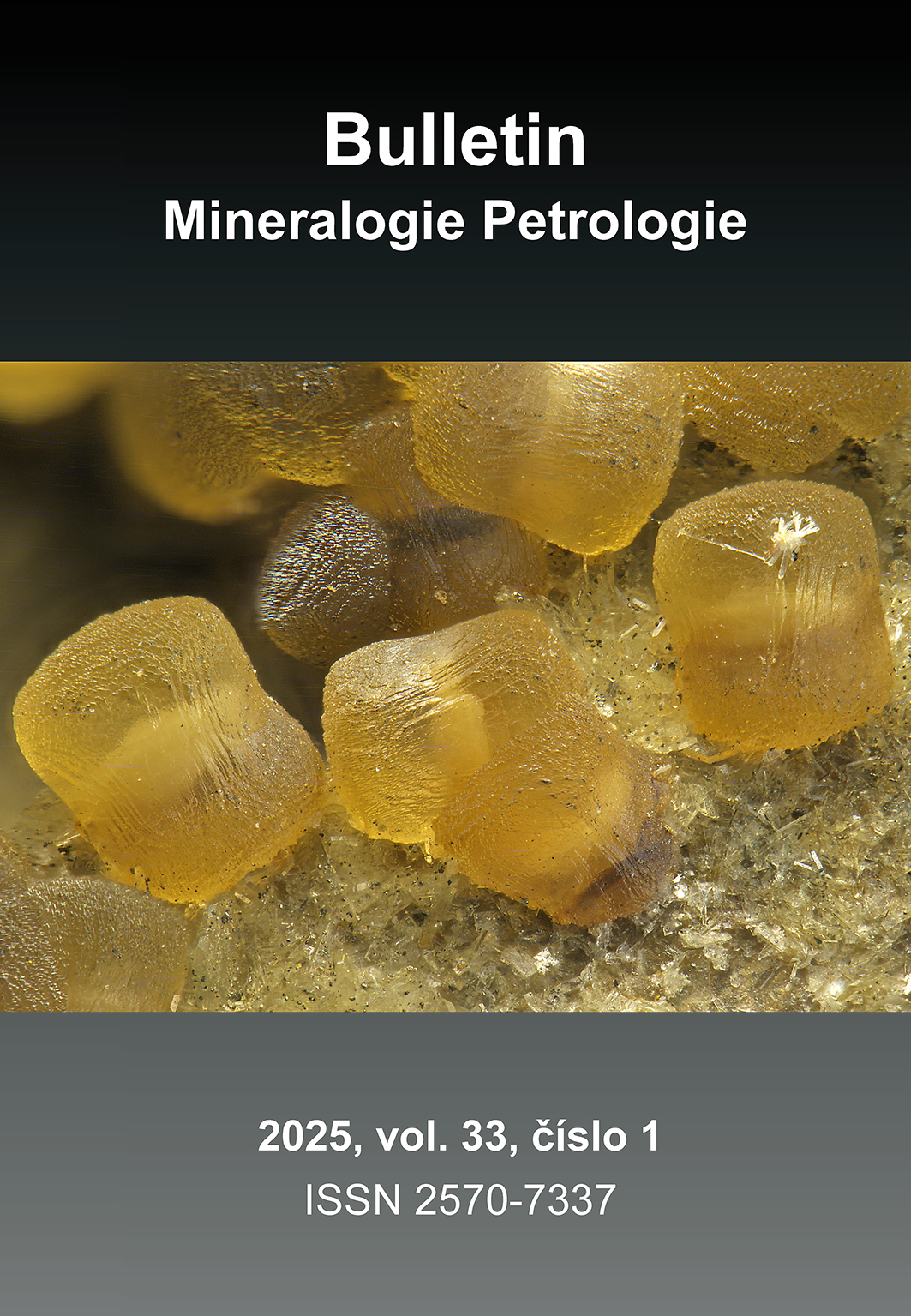Metamorfní reakce epidotu v žilách alpského typu na granát–anortitové symplektity: Markovice, kutnohorské krystalinikum
Metamorphic reaction of epidote in Alpine-type veins to garnet–anorthite symplectites: Markovice, Kutná Hora Unit (Bohemian Massif)
Klíčová slova
Abstrakt
Amphibolite quarry at Markovice near Čáslav, eastern Bohemia, is known as an important mineral locality producing high-quality mineral specimens for more than 100 years. Mineral assemblages feature dominantly Alpine-type minerals. A student study by V. Janoušek and A. Laciok in 1988, guided by the late Professor L. Žák, dealt mainly with epidote-group minerals. Above all, the study provided detailed characteristics of garnet–anorthite symplectite formed by destabilization of clinozoisite–epidote. The symplectites often preserve outer crystal shapes of the original clinozoisite–epidote crystals. Minor relics in the symplectite show that the original clinozoisite–epidote contained 8–9 wt. % Fe2O3. The reaction Ep ® Grt + An (+ O, H2O) at T ≈ 600 °C involved important Fe reduction, as the resulting garnet contains Alm 39.3, Adr 4.2, Grs 48.9, Prp 4.8, Sps 2.3, Uv 0.5 (mol. %). It is suggested that the geological and metamorphic evolution of the local amphibolites of the Kutná Hora Crystalline Unit included the following stages: 1) the older regional metamorphism that was instrumental in alteration of mafic volcanics and tuffs into amphibolite, 2) the brittle deformation, extension and fluid activity resulted in fractures with druses of clinozoisite–epidote, 3) in the course of a younger metamorphic event, the clinozoisite– epidote reacted under reducing conditions and its dehydration led to the formation of the studied garnet–anorthite symplectites, 4) later on, already at shallow crustal levels, late-Variscan, low-temperature fluids brought about crystallization of zeolites and hydrated silicates. The temporal sequence of processes is interpreted in terms of a polymetamorphic history of the host Kutná Hora Crystalline Unit. A repeated find of garnet–plagioclase symplectites replacing epidote crystal clusters in 2005 prompted preparation of this paper.
Soubory
Reference
Armbruster T., Bonazzi P., Akasaka M., Bermanec V., Chopin C., Gieré R., Heuss-Assbichler S., Liebscher A., Menchetti S., Pan Y., Pasero M. (2006) Recommended nomenclature of epidote-group minerals. Eur. J. Mineral. 18, 551–567.
Bernard J. H. (1981) Minerály alpských žil a jim podobných asociací. In: Bernard J.H. (ed.) Mineralogie Československa, 405–419. Academia, Praha.
Deer W.A., Howie R. A., Zussman J. (1997) Rock-forming Minerals, vol. 1B Disilicates and Ring Silicates. 1–629, Geological Society, London.
Fišera M. (2000) Alpská parageneze – klasifikace, typy a naleziště v České republice. Bull. mineral.–petrolog. Odd. Nár. Muz. (Praha) 8, 23–40.
Janoušek V., Laciok A. (1988) Žíly se zoisitem, klinozoisitem a epidotem z amfibolitu v Markovicích na Čáslavsku. 1–48, Nepublikovaná SVOČ práce, Přírodovědecká fakulta, Univerzita Karlova, Praha.
Koutek J. (1933) Geologie posázavského krystalinika I. Věstník SGÚ, 319–353.
Kratochvíl F. (1941) Poznámky k několika novým výskytům nerostů na Kutnohorsku a na Táborsku. Věda přírodní 20, 183–185.
Kratochvíl J. (1911) O nerostech okolí čáslavského. 41. Výroč. Zpr. Klubu Přírod., Praha.
Kratochvíl J. (1961) Topografická mineralogie Čech IV (L–N). 1–384, Nakladatelství ČSAV, Praha.
Krogh E. (2000) Distribution of Fe2+ and Mg between coexisting garnet and hornblende in synthetic and natural systems: an empirical calibration of the garnet–hornblende Fe–Mg geothermometer. Lithos 53, 265–277.
Leake B. E., Woolley A. R., Arps C. E. S., Birch W. D., Gilbert M. C., Grice J. D., Hawthorne F. C., Kato A., Kisch H. J., Krivovichev V. G., Linthout K., Laird J., Mandarino J., Maresch W. V., Nickel E. H., Rock N. M. S., Schumacher J. C., Smith J. C., Stephenson N. C. N., Whittaker E. J. W., Youzhi G. (1997). Nomenclature of amphiboles: report of the Subcommittee on Amphiboles of the International Mineralogical Association Commission on New Minerals and Mineral Names. Mineral. Mag. 61, 295–321.
Litochleb J. (1996) Markovice a Horky u Čáslavi – klasické lokality zeolitů v alpských žilách. Minerál 4, 98–100.
Nahodilová R., Faryad S. W., Dolejš D., Tropper P., Konzett J. (2011) High-pressure partial melting and melt loss in felsic granulites in the Kutná Hora Complex, Bohemian Massif (Czech Republic). Lithos 125, 641–658.
Pertoldová J., Verner K., Vrána S., Buriánek D., Štědrá V., Vondrovic L. (2010) Comparison of lithology and tectonometamorphic evolution of units at northern margin of the Moldanubian Zone: implications for geodynamic evolution in the northeastern part of the Bohemian Massif. J. Geosci. 55, 299–319.
Pouchou J. L., Pichoir F. (1985) “PAP”j(rz) procedure for improved quantitative microanalysis. In: Armstrong JT (ed): Microbeam Analysis. 104–106, San Francisco Press, San Francisco.
Růžička Č. (1946, 1947) Lomy a nerosty čáslavského okolí. Podoubraví, Vlastiv. Sbor. Čáslavska 15/4–5, 70–74, 108–112.
Synek J., Oliveriová D. (1993) Terrane character of the north-east margin of the Moldanubian Zone: the Kutná Hora Crystalline Complex, Bohemian Massif. Geol. Rundsch. 82, 566–582.
Tesař P. (2010a) Zpráva o nálezu natrolitu z lomu Markovice a Horky u Čáslavi. Minerál 18, 230–232.
Tesař P. (2010b) Karbonáty v lomu Markovice. Minerál 18, 233–238.
Tesař P. (2010c) Granáty v lomu Markovice. Minerál 18, 525–527.
Vrána S. (2008) Mineral inclusions in pyrope from garnet peridotites, Kolín area, central Czech Republic. J. Geosci. 53, 17–30.
Vrána S., Štědrá V., Nahodilová R. (2009) Geochemistry and petrology of high-pressure kyanite–garnet–albite–K-feldspar felsic gneisses and granulites from the Kutná Hora Complex, Bohemian Massif. J. Geosci. 54, 159–179.
Whitney D. L., Evans B. W. (2010) Abbreviations for names of rock-forming minerals. Amer. Miner. 93, 185–187.
